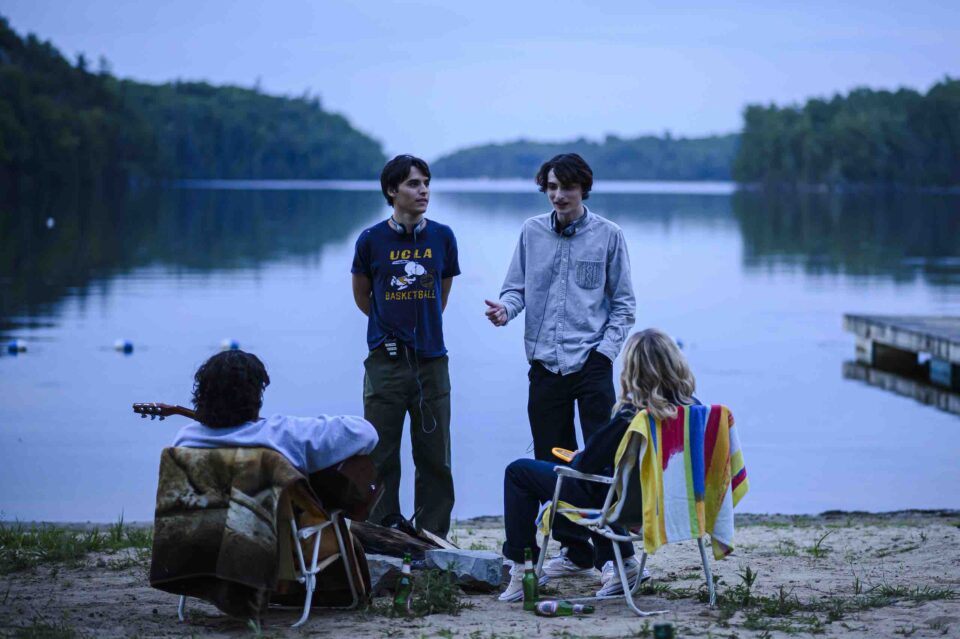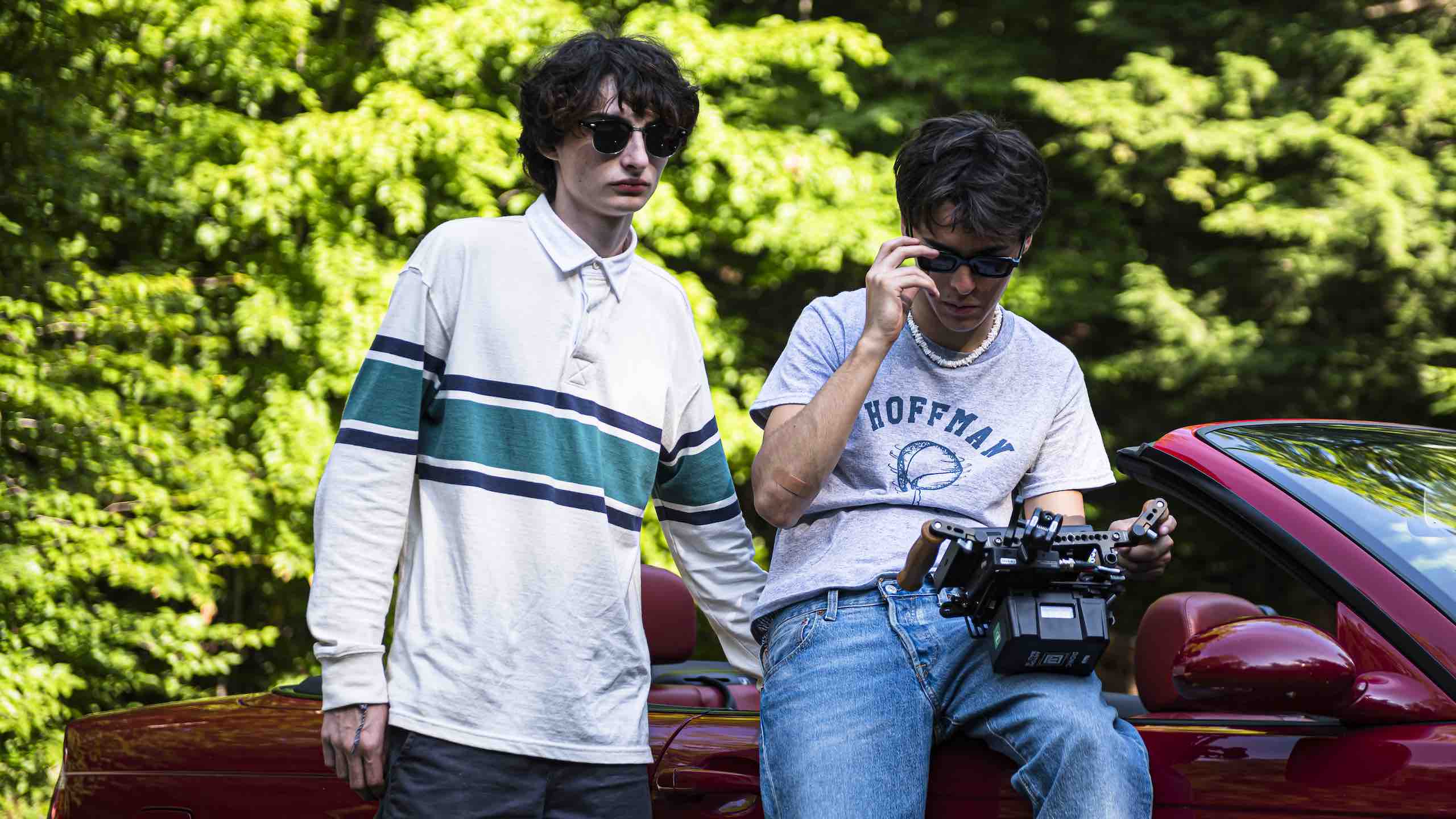After major roles in Stranger Things and the Ghostbusters franchise—not to mention launching The Aubreys, Calpurnia, and, most recently, his own solo music career—Finn Wolfhard has established himself as one of the most versatile creatives in Hollywood in recent years. The multi-hyphenate has further showcased this flexibility with his directorial debut with fellow actor Billy Bryk, Hell of a Summer. The horror-comedy takes place in the fictional Camp Pineway, where counsellors are being terrorized by a masked killer.
Despite being a big name in Hollywood, it took Wolfhard years to get this co-directorial collaboration with Bryk off the ground, as directorial work can be hard to come by—no matter your resume—when you’re in your early twenties. However, Wolfhard and Bryk believe that there’s a real value in having movies about teenagers made by younger people who can bring authenticity and relatability to the issues they’re facing through their art.
Although Hell of a Summer premiered at the Toronto International Film Festival back in 2023, the film finally hit theaters over the weekend. Here, Wolfhard and Bryk discuss working with a teen ensemble cast, how the horror genre provided them with the freedom their story needed, and more.
I saw that The Rizzler approved of the movie, which must be better than any review.
Finn Wolfhard: Do you know what would be amazing? If there was a little sticker on the Blu-ray to say “Rizzler-approved.” He loves his horror movies, man.
Billy Bryk: Anora did win Best Picture, but I don’t think it got Rizzler-approved. That could be a NEON first!
What was it about the horror genre that made it the perfect collaboration for you two?
FW: It offered a good opportunity for us to write a movie that featured a teen ensemble [cast], because—especially in the slasher genre—I think it really works when you have a younger cast. We were excited about the prospect of writing a movie for a younger ensemble, and then also adding the comedy element.
BB: It allowed us to push our sense of humor even further and put these characters that we were excited about into an insane circumstance and watch them squirm in a way that benefited the comedy of it. The other thing is, because there’s such an incredible community of horror film lovers, you’re allowed to take more risks and do more out-there things in the horror genre. I think that’s why a lot of the most exciting films being made right now are horror films—because of the audience. It would’ve been harder to sell this movie as exclusively a comedy, and it’s a much better movie because of the horror stuff.
“We were sick of reading and watching movies that featured a young cast that didn’t feel true to our generation, generally.” — Finn Wolfhard
You’ve talked in the past about how young people can bring a fresh perspective to filmmaking. How did this manifest when making Hell of a Summer?
FW: We were sick of reading and watching movies that featured a young cast that didn’t feel true to our generation, generally. I think older writers who’ve written movies surrounding a group of teenagers, there’s a big generational divide. While I think that there are some key differences and things that make our generation different from older generations, at the core there are universal things that every age group can relate to.
BB: It’s funny because you’ll read a script about young people written by an older person and you’ll go, “Dude, you’ve got this all wrong!” Their response is to be like, “Sorry, I can’t keep up with you kids.” Well, stop trying! You didn’t get it wrong because you don’t know the newest word that somebody should say for “cool,” you got it wrong because you’re assuming there’s a giant difference when there isn’t.
FW: Right, just focus on the characters. It should be reversed: if you just focus on writing a movie, and really focus on the characters without trying to make it current or contemporary, then you’ll be in a great position.
BB: It’ll feel contemporary accidentally if you have a good actor and there’s some wording that feels too old. They can just update it—that’s the easiest thing in the world to do.

It almost feels like that Steve Buscemi meme, “How do you do, fellow kids?”
BB: Yes! In the last interview I did, I said that exact thing. It feels like that meme, but in script form.
What movies did you look at for inspiration?
BB: A film that we talked about from the very beginning was Shaun of the Dead. Even though it’s a zombie movie at its core, it’s a movie about this lost semi-loser character who’s trying to win his girlfriend back in the face of a zombie apocalypse. To us, it was this amazing character-driven story that was also an incredible zombie movie. We wanted to make a movie that was about coming of age, leaving behind this part of your childhood, stepping into adulthood, and other things like being insecure or finding a new relationship. We wanted to do to the slasher genre what Shaun of the Dead did to the zombie movie, where you’re telling a story that feels honest and true and universal within these extraordinary circumstances.
“We wanted to do to the slasher genre what Shaun of the Dead did to the zombie movie, where you’re telling a story that feels honest and universal within these extraordinary circumstances.” — Billy Bryk
Did your acting careers help when dealing with other actors?
FW: I think so. Sometimes as an actor you’ll work with a director who doesn’t know what it’s like to be an actor, and that can make it tougher and maybe a little isolating. It’s a common thing, because most directors haven’t acted. I feel like if you’re being directed by an actor there’s a different sensitivity to giving notes or talking about things because as an actor, you know what it’s like to receive notes from a director where it doesn’t feel like they understand what you’re going through and how nerve-wracking and vulnerable it can be. Approaching it with a little more sensitivity and knowing what it’s like to be an actor does help, because it feels like you’re all in it together and not like you’re ordering someone to go from here to there. You feel things together a little more.
Finn, you worked with one of the great horror filmmakers of our generation, Guillermo del Toro, on Pinocchio. Was there any advice that you took from that experience into this movie?
FW: Yeah, he said that when you’re showing people your movie for the first time, you should expect and want it to be ripped apart before you put it out—especially with people you respect and like, because that’s how you get the best changes. You need to have someone who’s going to be honest with you about what’s working and what isn’t and what needs to be fixed. He basically said that it’s always worth having people watch it and just give brutal feedback and notes. FL









